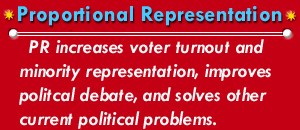Answering Common Concerns
 Critics of PR have charged that proportional representation causes
additional gridlock, making it harder for government to function. Germany,
Sweden, the Netherlands, and Switzerland provide counter-examples to this
theory, however, having enacted comprehensive legislation. It is important
to remember that compromise is needed in all forms of government; PR at
least affords everyone a voice at the table. In PR democracies, different
coalitions form around different issue agendas. Union representatives and
environmentalists may join together in some instances but may oppose each
other on other issues. The legislation developed would need to reflect the
diversity of views of the entire population or else it would be unable to
gain enough support to pass. Furthermore, indecision in government does not
have to be disastrous. Political control has shifted between parties many
times in America. In Ireland, voters have ended the rule of the incumbent
government in every election of the last 24 years but maintain stability
and a high economic growth rate.
Critics of PR have charged that proportional representation causes
additional gridlock, making it harder for government to function. Germany,
Sweden, the Netherlands, and Switzerland provide counter-examples to this
theory, however, having enacted comprehensive legislation. It is important
to remember that compromise is needed in all forms of government; PR at
least affords everyone a voice at the table. In PR democracies, different
coalitions form around different issue agendas. Union representatives and
environmentalists may join together in some instances but may oppose each
other on other issues. The legislation developed would need to reflect the
diversity of views of the entire population or else it would be unable to
gain enough support to pass. Furthermore, indecision in government does not
have to be disastrous. Political control has shifted between parties many
times in America. In Ireland, voters have ended the rule of the incumbent
government in every election of the last 24 years but maintain stability
and a high economic growth rate.
How to Get There
 The battle for proportional representation will be hard fought. An
effective coalition will need to be built between those who would benefit
from the change. Religious conservatives, libertarians, progressives,
institutional reformers, 3rd party members, and young independents would
all likely support a multi-party system. If this sizable population could
effectively join together and put PR high on their agenda, the issue could
gain momentum. A PR movement could tap the current popular disaffection
with our political institutions, possibly as part of a broader
institutional reform movement. Supporters of term limits, campaign finance
reform, or a national initiative process might add PR to their agenda.
The battle for proportional representation will be hard fought. An
effective coalition will need to be built between those who would benefit
from the change. Religious conservatives, libertarians, progressives,
institutional reformers, 3rd party members, and young independents would
all likely support a multi-party system. If this sizable population could
effectively join together and put PR high on their agenda, the issue could
gain momentum. A PR movement could tap the current popular disaffection
with our political institutions, possibly as part of a broader
institutional reform movement. Supporters of term limits, campaign finance
reform, or a national initiative process might add PR to their agenda.
The battle can also be waged through incremental changes. Single-member
districts are not required by the U.S. Constitution. A simple statutory change
could allow state governments to use PR systems to elect their delegations
to the U.S. House of Representatives. At the state and local level
throughout America, citizens could call for experiments with PR.
Commissions on voting reform could be established at all levels of
government; the goal would be studying low voter turnout and ways to
increase voter participation. They could be encouraged to study PR and some
would advocate it as a solution. Thus, a voting system that may seem
utopian could be only a few steps away. Increased public knowledge about
the issue is the most effective tool in the struggle.









